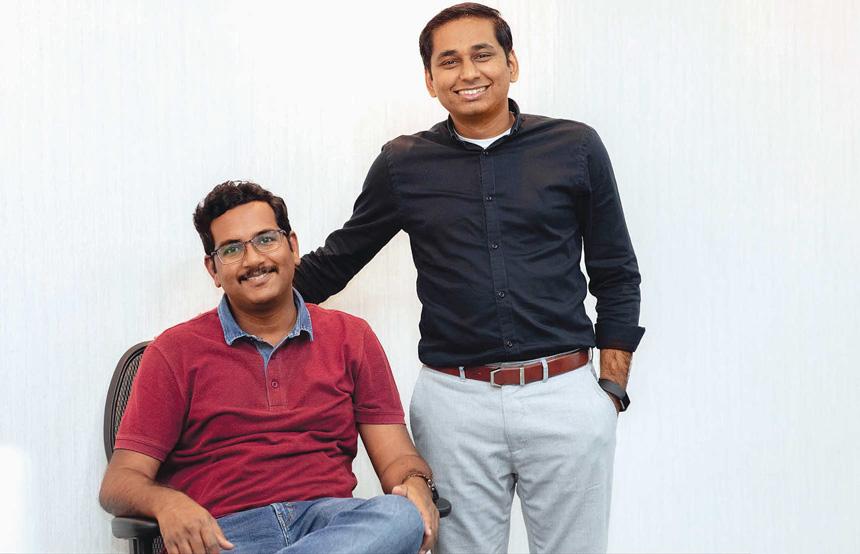Denemek ALTIN - Özgür
Wellness on demand
THE WEEK India
|December 01, 2024
Starting as a doctor-patient chat platform, Medibuddy has evolved to be India's largest on-demand, full-stack digital health care platform

In 2010, Satish Kannan and Enbasekar D., two undergraduate students from IIT Madras, took part in a national student innovation competition. They had previously worked together on building an unmanned aerial vehicle for aerial surveying similar to the one Aamir Khan's character Rancho flew in the 2009 film 3 Idiots. But for the competition, they pivoted to health care, developing a compact ECG device.
The device could connect directly to a mobile phone, enabling patients to monitor their heart health conveniently. If irregularities were detected, the device would send an SMS alert. Their project won the competition, but more important, the project put the duo in touch with a lot of doctors, who advised them on the project.
While visiting the doctors, Satish and Enbasekar noticed patients enduring long waits just for brief consultations. "We discovered that many patients were making long, arduous trips to Chennai from remote parts of Tamil Nadu for follow-up appointments," said Enbasekar. "They would then spend hours waiting, only to have a quick consultation. This experience underscored the urgent need to improve health care access, inspiring us to tackle this issue. With mobile phones and software starting to evolve around that time, we began our startup journey."
Enbasekar added that back when he was a student, he relied on laptops and Google Talk to share notes, exchange questions and even make plans with his peers. "This got us thinking-why doctors and patients did not use such tools? However, we realised that many doctors didn't use laptops and were often too busy for email communication," he said.
Bu hikaye THE WEEK India dergisinin December 01, 2024 baskısından alınmıştır.
Binlerce özenle seçilmiş premium hikayeye ve 9.000'den fazla dergi ve gazeteye erişmek için Magzter GOLD'a abone olun.
Zaten abone misiniz? Oturum aç
THE WEEK India'den DAHA FAZLA HİKAYE

THE WEEK India
Lore to the fore
A tribal museum in Nava Raipur celebrates Chhattisgarh's forgotten freedom fighters
3 mins
December 14, 2025

THE WEEK India
QUIET BRILLIANCE
In a world of shrinking attention span and hyperactive media consumption, a Grammy-nominated album on the Dalai Lama offers a cultural counterpoint
4 mins
December 14, 2025

THE WEEK India
THE ART OF PLAY
What video games can teach you about yourself
5 mins
December 14, 2025
THE WEEK India
Why Delhi can't be Indraprastha
The recent proposal by a Delhi BJP MP to officially rename the capital city from Delhi to 'Indraprastha'—invoking the legendary city of the Pandavas from the Mahabharat—is more than a superficial suggestion. It is a politically motivated attempt to rewrite the complex, multilayered history of one of the world’s oldest continuously inhabited metropolises.
3 mins
December 14, 2025

THE WEEK India
UKRAINIANS ARE WRITING THE CHRONICLES OF OUR TIMES WITH THEIR BLOOD, WE ARE SHAPING HISTORY
Viktor Yushchenko is a towering figure in Ukrainian politics.
10 mins
December 14, 2025

THE WEEK India
India through Mexican eyes
A book on Mexican poet Octavio Paz's years in India offers fresh perspectives
3 mins
December 14, 2025

THE WEEK India
Freedom on independence day
Volodymyr Mykolayenko, mayor of the city of Kherson in south Ukraine from February 2014 till December 2020, was aware of the perils of Russian attacks, because he witnessed the occupation of Crimea in 2014. But he never believed that Russians would attack the south of Ukraine and that too his city, Kherson. Here are excerpts from what he told Mridula Ghosh after he was freed from Russian captivity.
3 mins
December 14, 2025

THE WEEK India
'Ten'acious ties
The significance of Putin's 10th visit to India exceeds previous trips
4 mins
December 14, 2025

THE WEEK India
We shall implement the master plan as designed by the Mother
Q/When you took over, what was your idea of Auroville, and how has it changed under you?
3 mins
December 14, 2025

THE WEEK India
Moments of truth for Ukraine
Reaching the fourth year of Russian aggression, a new page opens in the history of Ukraine, torn by war and darkness, its energy infrastructure destroyed by Russia. The hour of reckoning emerges as the powers-that-be ponder how to win the war amidst a bombshell corruption investigation of the energy sector and a 28-point peace menu offered by the US
5 mins
December 14, 2025
Listen
Translate
Change font size
